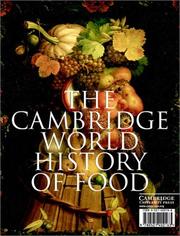| Listing 1 - 5 of 5 |
Sort by
|

ISBN: 9780521402149 9781139058636 9780521402156 0521402158 052140214X 0521402166 9780521402163 9780521402163 0521402166 Year: 2015 Publisher: New York Cambridge University Press
Abstract | Keywords | Export | Availability | Bookmark
 Loading...
Loading...Choose an application
- Reference Manager
- EndNote
- RefWorks (Direct export to RefWorks)
Edited by Kenneth F. Kiple and Kriemhild Coneè Ornelas, and described by BBC Good Food Magazine as 'Unparalleled in its knowledge and content.', The Cambridge World History Of Food was published in two volumes by Cambridge University Press in 2000. Since then, it has become the go-to resource for anyone studying (or simply curious of) food history and the impact it has had on cultures around the world. Read more at http://www.cambridge.org/us/academic/cambridge-world-history-food#DGCmzkTbPARZlMjZ.99
Voeding --- Gezondheid --- Geschiedenis --- Eetcultuur --- Cultuurgeschiedenis --- Geneeskunde --- Techniek (wetenschap) --- Gedrag --- Atlas --- Museum --- Drank --- Vie quotidienne --- Nourriture --- Histoire --- Food - History --- Food --- #KVHA:Voeding. Woordenboeken. Engels --- #KVHA:Voedsel. Woordenboeken. Engels --- 331.100 --- 331.11 --- 338.724 --- AA / International- internationaal --- NBB multivolumes --- 641 <031> --- 641 <09> --- 641 <09> Geschiedenis van de voeding --- Geschiedenis van de voeding --- History --- Economische geschiedenis: algemeenheden --- Geschiedenis van de landbouw --- Teelten --- Voeding. Voedsel--(zie ook {392.8})--Encyclopedieën. Lexica --- History. --- Nutritionary hygiene. Diet --- Agriculture. Animal husbandry. Hunting. Fishery --- World history --- Aliments --- Encyclopedias --- Encyclopédies
Book
ISBN: 9780521402156 9781139058643 Year: 2000 Publisher: Cambridge Cambridge University Press
Abstract | Keywords | Export | Availability | Bookmark
 Loading...
Loading...Choose an application
- Reference Manager
- EndNote
- RefWorks (Direct export to RefWorks)
Edited by Kenneth F. Kiple and Kriemhild Coneè Ornelas, and described by BBC Good Food Magazine as 'Unparalleled in its knowledge and content.', The Cambridge World History Of Food was published in two volumes by Cambridge University Press in 2000. Since then, it has become the go-to resource for anyone studying (or simply curious of) food history and the impact it has had on cultures around the world. Read more at http://www.cambridge.org/us/academic/cambridge-world-history-food#DGCmzkTbPARZlMjZ.99
Voeding --- Gezondheid --- Geschiedenis --- Eetcultuur --- Cultuurgeschiedenis
Book
ISBN: 1139058649 Year: 2000 Publisher: Cambridge : Cambridge University Press,
Abstract | Keywords | Export | Availability | Bookmark
 Loading...
Loading...Choose an application
- Reference Manager
- EndNote
- RefWorks (Direct export to RefWorks)
An undertaking without parallel or precedent, this monumental volume encapsulates much of what is known of the history of food and nutrition. It constitutes a vast and essential chapter in the history of human health and culture. Ranging from the eating habits of our prehistoric ancestors to food-related policy issues we face today, this work covers the full spectrum of foods that have been hunted, gathered, cultivated, and domesticated; their nutritional make-up and uses; and their impact on cultures and demography. It offers a geographical perspective on the history and culture of food and drink and takes up subjects from food fads, prejudices, and taboos to questions of food toxins, additives, labelling, and entitlements. It culminates in a dictionary that identifies and sketches out brief histories of plant foods mentioned in the text - over 1,000 in all - and additionally supplies thousands of common names and synonyms for those foods.
Book
ISBN: 1139058630 Year: 2000 Publisher: Cambridge : Cambridge University Press,
Abstract | Keywords | Export | Availability | Bookmark
 Loading...
Loading...Choose an application
- Reference Manager
- EndNote
- RefWorks (Direct export to RefWorks)
An undertaking without parallel or precedent, this monumental volume encapsulates much of what is known of the history of food and nutrition. It constitutes a vast and essential chapter in the history of human health and culture. Ranging from the eating habits of our prehistoric ancestors to food-related policy issues we face today, this work covers the full spectrum of foods that have been hunted, gathered, cultivated, and domesticated; their nutritional make-up and uses; and their impact on cultures and demography. It offers a geographical perspective on the history and culture of food and drink and takes up subjects from food fads, prejudices, and taboos to questions of food toxins, additives, labelling, and entitlements. It culminates in a dictionary that identifies and sketches out brief histories of plant foods mentioned in the text - over 1,000 in all - and additionally supplies thousands of common names and synonyms for those foods.


ISBN: 076580025X 0765806851 Year: 2001 Publisher: New Brunswick Transaction
Abstract | Keywords | Export | Availability | Bookmark
 Loading...
Loading...Choose an application
- Reference Manager
- EndNote
- RefWorks (Direct export to RefWorks)
Animal experimentation has made a crucial contribution to many of the most important advances in modern medicine. The development of vaccines for deadly viruses like rabies and yellow fever depended upon animal research, and much of our basic knowledge about human health and physiology was discovered through the use of animals as well. Inspite of these gains, animal rights activists have been zealous in communicating to the public and policymakers their view that the use of animals in medical research is morally wrong and should be severely curtailed or eliminated. The activists' arguments draw upon a range of disciplines and focus on both practical and ethical aspects of animal experimentation. Advocates of animal experimentation have been slow to respond to these arguments. Given that the worldwide toll of communicable diseases is still immense--and that deadly new pathogens may emerge at any time in the future to menace human health--failing to defend animal experimentation from the arguments of its opponents has disastrous implications. A quick response to an unanticipated threat on the order of the AIDS epidemic is unimaginable absent a vigorous research establishment, which in turn is dependent on animal proxies. This work is an attempt by research scientists and moral philosophers to mount a defence against animal rights enthusiasts. Contributors scrutinize how animal experimentation functions in the laboratory, the role that it plays in eradicating disease, and the moral justification for using animals. "Why Animal Experimentation Matters" is a first attempt by research scientists and moral philosophers to mount a convincing defense against animal rights enthusiasts. Because opponents of animal experimentation come from a variety of intellectual backgrounds, this defense is necessarily interdisciplinary as well. In this collection of eight essays, the authors scrutinize how animal experimentation actually functions in the laboratory, the vital role that it plays in palliating and eradicating human and animal diseases, and the moral justification for sacrificing animals for the betterment of human life. The subjects covered in the essays include the moral status of animals and persons, the importance of animals for advancing scientific knowledge, the history of animal experimentation (and of its detractors), differing theoretical approaches of American and European animal-experimentation regulations, the heavily restrictive legislation promoted by animal rights activists, and the threats posed to research and researchers by violent animal rights zealots. This important anthology will be of interest to scientists, philosophers, individuals suffering from heritable or communicable diseases, relatives of afflicted individuals, and policymakers.
Animal experimentation --- Animal models in research --- Animal welfare --- Animals --- Medicine --- Moral and ethical aspects. --- Treatment --- Research --- experiment, experimenteel onderzoek (dieren, dierproeven) --- medisch-wetenschappelijk onderzoek --- ethiek (ethische aspecten) --- expérimentation sur l'animal --- recherche médicale --- ethique (aspects ethiques) --- Health Workforce --- Biological models --- Laboratory animals --- Moral and ethical aspects --- Research&delete&
| Listing 1 - 5 of 5 |
Sort by
|

 Search
Search Feedback
Feedback About UniCat
About UniCat  Help
Help News
News